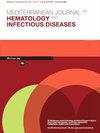治疗相关髓系肿瘤:易感性和克隆进化
IF 2
4区 医学
Q3 HEMATOLOGY
Mediterranean Journal of Hematology and Infectious Diseases
Pub Date : 2023-10-30
DOI:10.4084/mjhid.2023.064
引用次数: 0
摘要
治疗相关性髓系肿瘤(t-MN)是原发性肿瘤和自身免疫性疾病的细胞毒性治疗最严重的长期后果之一。从临床角度来看,当前治疗策略的生存期差和难治性是受影响患者的特征。在我们的老龄化社会中,新的治疗方法和改进的癌症管理方案正在提高癌症患者的预期寿命,治疗相关的髓系肿瘤是一个新出现的问题。尽管几个研究小组已经对t-MN发展的主要危险因素做出了贡献,但原发性肿瘤的多样性,与不同的治疗策略和正在开发的新药有关,使得对当前数据的解释仍然很复杂。涉及t-MN发病机制的主要危险因素可分为患者特异性、遗传性和获得性易感性。虽然t-MN可以发生在任何年龄,但随着年龄的增长,风险往往会增加,而老年患者的特点是合并症较多,更有可能患上这种疾病。由于深度测序技术的可用性,在15-20%的t-MN患者中报道了种系变异,突出了它们在癌症易感性中的作用。越来越明显的是,在化疗和/或放疗的正选择压力下,t-MN与驱动基因突变可能出现在不确定电位克隆造血(CHIP)的背景下。虽然CHIP通常被认为是良性的,但它与t-MN的风险增加有关。在这种情况下,克隆进化现象可以被描述为预先存在的克隆扩展的动态过程,无论是否获得额外的遗传改变,通过有利于更具侵略性和/或抗性的克隆的增殖,可能在从白血病前期状态到t-MN的进展中发挥关键作用。本文章由计算机程序翻译,如有差异,请以英文原文为准。
THERAPY-RELATED MYELOID NEOPLASMS: PREDISPOSITION AND CLONAL EVOLUTION
Therapy-related Myeloid Neoplasm (t-MN) represents one of the worst long-term consequences of cytotoxic therapy for primary tumors and autoimmune disease. Poor survival and refractoriness to current treatment strategies characterize affected patients from a clinical point of view. In our aging societies, where newer therapies and ameliorated cancer management protocols are improving the life expectancy of cancer patients, therapy-related Myeloid Neoplasms are an emerging problem. Although several research groups have contributed to characterizing the main risk factors in t-MN development, the multiplicity of primary tumors, in association with the different therapeutic strategies available and the new drugs in development, make interpreting the current data still complex. The main risk factors involved in t-MN pathogenesis can be subgrouped into patient-specific, inherited, and acquired predispositions. Although t-MN can occur at any age, the risk tends to increase with advancing age, and older patients, characterized by a higher number of comorbidities, are more likely to develop the disease. Thanks to the availability of deep sequencing techniques, germline variants have been reported in 15-20% of t-MN patients, highlighting their role in cancer predisposition. It is becoming increasingly evident that t-MN with driver gene mutations may arise in the background of Clonal Hematopoiesis of Indeterminate Potential (CHIP) under the positive selective pressure of chemo and/or radiation therapies. Although CHIP is generally considered benign, it has been associated with an increased risk of t-MN. In this context, the phenomenon of clonal evolution may be described as a dynamic process of expansion of preexisting clones, with or without acquisition of additional genetic alterations, that, by favoring the proliferation of more aggressive and/or resistant clones, may play a crucial role in the progression from preleukemic states to t-MN.
求助全文
通过发布文献求助,成功后即可免费获取论文全文。
去求助
来源期刊

Mediterranean Journal of Hematology and Infectious Diseases
Medicine-Hematology
CiteScore
4.20
自引率
6.20%
发文量
113
审稿时长
12 weeks
期刊介绍:
Reciprocal interdependence between infectious and hematologic diseases (malignant and non-malignant) is well known. This relationship is particularly evident in Mediterranean countries. Parasitosis as Malaria, Leishmaniosis, B Hookworms, Teniasis, very common in the southeast Mediterranean area, infect about a billion people and manifest prevalently with anemia so that they are usually diagnosed mostly by experienced hematologist on blood or bone marrow smear. On the other hand, infections are also a significant problem in patients affected by hematological malignancies. The blood is the primary vector of HIV infection, which otherwise manifest with symptoms related to a reduction in T lymphocytes. In turn, infections can favor the insurgency of hematological malignancies. The causative relationship between Epstein-Barr virus infection, Helicobacter pylori, hepatitis C virus, HIV and lymphoproliferative diseases is well known.
 求助内容:
求助内容: 应助结果提醒方式:
应助结果提醒方式:


